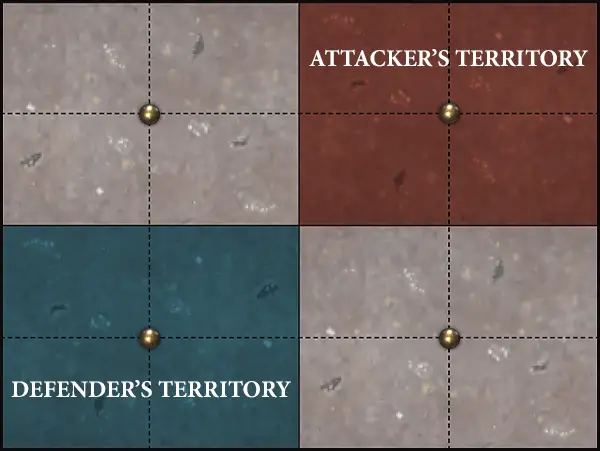Pitched Battles ’22-23 S2
This battlepack presents this season’s rules for playing Pitched Battles as part of a matched play event. Each season we will provide a new set of rules that includes an exclusive setting for your battles to take place in, new grand strategies, battle tactics, realm rules and battleplans. This season is set in Gallet, the Splintered Land.
Contents | ||
Books
| Book | Kind | Edition | Last update | |
 General’s Handbook ’2022: Pitched Battles 2022-23 Season 2 General’s Handbook ’2022: Pitched Battles 2022-23 Season 2 | ||||
 General’s Handbook ’2022: Pitched Battles 2022-23 Season 2 General’s Handbook ’2022: Pitched Battles 2022-23 Season 2 | Expansion | 3 | May 2023 | |
FAQ
| Q: | If I add units to a Pitched Battle army after a battle has started, can I do so in excess of any limits that apply? For example, could I summon extra Behemoths if my army already included the maximum number it can take? |
| A: | The limits on the number of Leaders, Artillery units and Behemoths only apply when you are picking your army, so you can ignore these limits when you add these kinds of units to your army. The limit on Unique units still applies, however (you can never have more than 1 of the same type of Unique unit in your army). |
| Q: | If a Pitched Battle profile for a unit appears in the most recent General’s Handbook, can I use that unit in Pitched Battles even if that unit is not listed in the table of a specific faction? |
| A: | Yes. |
| Q: | If I have multiple abilities and other effects to be applied at the start of my hero phase, can I apply them before I pick my battle tactic? |
| A: | Yes. |
| Q: | Can I gain control of multiple objectives in ‘The Lurkers Below’ in the same turn? |
| A: | No. |
| Q: | Can I set up faction terrain features in the ‘Battlelines Drawn’ battleplan? |
| A: | Yes. The quarters of the battlefield in this battleplan are only treated as objectives and do not prevent you from setting up models or terrain features. |
| Q: | Can I set up gravesites using the Soulblight Gravelords battle trait ‘The Unquiet Dead’ in the ‘Battlelines Drawn’ battleplan? |
| A: | Yes, see above. |
| Q: | If I add a unit to my army after the battle begins, and that unit has the Battleline battlefield role, does that unit count as a Battleline unit for the purposes of rules, battle tactics and grand strategies? |
| A: | Yes. |
| Q: | Could you use the ‘Tunnel Master’ Aspect of the Champion instead of making a normal move that takes place during a different phase, for instance, when using the Mighty Destroyers battle trait to make a normal move in the hero phase? |
| A: | Yes. |
| Q: | Does the Shrines of Conquest rule in the ‘Only the Worthy’ battleplan apply to contesting terrain features? |
| A: | No. |
| Q: | If an effect would increase the Wounds characteristic of a GALLETIAN CHAMPIONS unit above the required threshold, does that unit lose the GALLETIAN CHAMPIONS keyword? |
| A: | No. |
| Q: | Does ‘Fuelled by Ghurish Rage’ count as a ward save? |
| A: | Yes. |
| Q: | If a Slaves to Darkness player chooses the Daemonhood effect for the Dark Apotheosis result on the Eye of the Gods table and the HERO is a GALLETIAN CHAMPION, does the Daemon Prince added to their army gain the GALLETIAN CHAMPION keyword? Could that Daemon Prince use an Aspect of the Champion enhancement that the HERO had? |
| A: | No, the Daemon Prince would not gain the GALLETIAN CHAMPION keyword. While the Daemon Prince would gain the Aspect of the Champion enhancement that the HERO had, it would not be able to use it as it lacks the GALLETIAN CHAMPION keyword. |
Getting Started
- First, you need to do is agree on the points limit for the battle.
- Next, pick 1 faction for your army and consult the Pitched Battles table to see the restrictions that apply when picking your units.
- Then, record the details of your army on your army roster. This includes the grand strategy you have selected, the units you have included and the enhancements you have picked for them.
- Finally, determine the battleplan you will play, making sure that you have read the realm rules before the battle begins. All that remains is to fight the battle itself!
Pitched Battles
Battles fought using this battlepack are Pitched Battles. The following rules apply to battles fought using this battlepack:1. Points Limit
You and your opponent will first need to agree on a points limit for the battle. The points limit for the battle can be either 1000 or 2000. After you have agreed on a points limit, look it up on the Pitched Battles table below. The table lists the restrictions on what the players can include in their armies.
| |||||||||||||||||||||||||||||||||
2. Pick Your Army
Next, you must pick your army following the restrictions below.| See Pitched Battle Publications 2022-23 - Season 2 for a list of publications whose rules you are allowed to use when picking your army. | ||
Faction
You must pick 1 faction for your army. All of the units in your army must be from a single faction.Battlefield Roles
The Pitched Battles table lists the minimum number of Leader and Battleline units you must include in your army and the maximum number of Leader, Behemoth and Artillery units you can include in your army.Your general must have the Leader battlefield role. A model that has both the Leader and Behemoth battlefield roles counts as 1 Leader and 1 Behemoth in your army. If a unit has both the Battleline and Behemoth battlefield roles, that unit does not count toward the maximum number of Behemoth units you can include in your army.
| Remember that allied units are ignored when determining if the units in the army are from a single faction (core rules, 27.1). | ||
Battalions
You can include core battalions in your army but you cannot include warscroll battalions.Understrength and Reinforced Units
The Pitched Battles table lists how many reinforced units you can include in your army. Only Battleline units can be reinforced twice. You cannot include understrength units in a Pitched Battle army.Allied Units
The maximum number of points that you can spend on allies from your points allowance is shown on the Pitched Battles table. Allied units do not count towards the number of Battleline units in your army. However, they do count towards the maximum number of Leader, Behemoth and Artillery units in your army.Coalition Units
Coalition units do not count towards the number of Battleline units in your army. However, they do count towards the maximum number of Leader, Behemoth and Artillery units in your army. In addition, coalition units are ignored when determining if the units in your army are from a single faction.Endless Spells and Invocations
The Pitched Battles table lists the maximum number of endless spells and invocations you can include in your army. You cannot include the same endless spell or invocation more than once in your army.3. Fill Out Your Army Roster
Once you have picked your army, record the details on your army roster and show it to your opponent before setting up your army at the start of the battle. Your roster must include a list of the units, battalions, endless spells and invocations in your army; what size the units are; which units are in each battalion; the army’s faction; the grand strategy you have picked; which units are allies; and which model is the army’s general.Use the Notes column on the roster to record the command models you have chosen for each unit, the spells and prayers that are known by the WIZARDS and PRIESTS in your army, any artefacts of power you have given to HEROES in your army, and the command trait you have chosen for your general. If your army includes any units that are given keywords when they are set up, such as units with a Mark of Chaos, these keywords must be written down when the unit is added to the roster.
Grand Strategies
When you are filling out your army roster, you can pick 1 grand strategy. Your grand strategy represents what your army is trying to accomplish, and achieving it can make all the difference in a closely fought battle. The rules for how to use grand strategies can be found here.4. To War!
After you and your opponent have filled out your army rosters, it’s time to determine the battleplan that you will use. In this section you will find special rules that apply to battles fought using this battlepack.Pitched Battle Battleplans
The players roll off and the winner rolls a dice. On a 1-3, Battleplan Table 1 is used; on a 4-6, Battleplan Table 2 is used (see below). Then, their opponent rolls a dice to determine which battleplan is used for the game.Battle Tactics
Battle tactics are secondary objectives that the armies can attempt to achieve as the opportunity presents itself during the battle. Each battle tactic you pick will give you a new goal for your army to aim for in each of your turns. The rules for how to use battle tactics can be found here.Realm Rules
You must use the Region of War: Gallet (Season 2) realm rules.Terrain Features
The Pitched Battles table lists the recommended minimum number of terrain features to be set up on the battlefield. Each terrain feature must be set up more than 3" from the battlefield edge, more than 6" from all other terrain features and more than 3" from all objectives. If it is impossible for a terrain feature to be set up, it is not used.| Some events will have battlefields with terrain features that have been set up before both players arrive at the table, or the position of terrain features may have been predetermined by a third party. If this is the case, the players roll off to determine who is the attacker and defender as normal, with the attacker picking the territory in which they wish to deploy and setting up the first unit. If a faction terrain feature must be set up before any other terrain features and the battlefield has already been set up by a third party, set up that faction terrain feature before territories are determined. | ||
Faction Terrain
Faction terrain features must be set up more than 3" from all other terrain features and more than 3" from all objectives. These restrictions are in addition to the set-up rules in the battletome in which they appear. If it is impossible for a faction terrain feature to be set up, it is not used.Mysterious Terrain
The defender must roll on the Mysterious Terrain table from the core rules (see 28.1.3) to determine additional scenery rules that apply to any terrain features that do not have a warscroll. Roll on the Mysterious Terrain table for each applicable terrain feature after it has been set up.Alternating Deployment
If a battleplan says that the players use alternating deployment, then the players alternate setting 1 unit at a time. The players continue to set up their units until both armies have been set up. If one player finishes setting up their army first, their opponent must set up the rest of the units in their army, one after another.Stealing the Initiative
Do not roll off to determine who has priority in the first battle round. Instead, the player who finished deploying their army first has priority in the first battle round.Realm Rules
Region of War: Gallet (Season 2)
The following realm rules continue to explore what it is like to fight in the hellish environments of Gallet. In such grim conditions, those leaders who stand shoulder to shoulder with their comrades will rise to the fore, anchoring their battlelines and ensuring victory is achieved at any cost.
Special Rules
Galletian Champions: Some warriors achieve true greatness in the merciless cavern-wars of Gallet. These heroes earn the reverence of their followers, for often their presence means the difference between survival and death in this unforgiving place.HEROES with a Wounds characteristic of less than 10, that do not have a mount (with the exception of companions) and that are not Unique gain the GALLETIAN CHAMPION keyword.
The Key to Victory: So respected are the champions of Gallet that their troops constantly keep watch for anything that might endanger them, knowing that the survival of these heroes is essential to any hope of triumph.
Friendly GALLETIAN CHAMPIONS cannot be picked as the target of attacks made with missile weapons while they are within 1" of any friendly Battleline units.
Desperate Action: In Gallet, there is little time to prevaricate or secondguess one’s actions. Those war leaders who survive their initial forays into this place learn to trust their instincts, and to act with decisive boldness to exploit weaknesses in the enemy’s battleline.
If you are taking the second turn in the current battle round, at the start of your hero phase, you can pick 1 friendly GALLETIAN CHAMPION on the battlefield to carry out 2 different heroic actions in that phase instead of 1.
Heroic Actions
You can carry out 1 of the following heroic actions with a friendly GALLETIAN CHAMPION instead of any other heroic action you can carry out with that HERO:
|
Realmsphere Magic
All WIZARDS know the following spell in addition to any others that they know:Grinding Teeth of Gallet: The caster channels power through a node of Ghurish magic to manifest a cluster of chomping maws in the battlefield floor. Those unlucky enough to be stood on top of these gnashing pits are swiftly devoured from the feet up.
Grinding Teeth of Gallet is a spell that has a casting value of 6 and a range of 12". If successfully cast, pick 1 objective within range. Then, roll a dice for each unit within 6" of that objective. On a 4+, that unit suffers D6 mortal wounds.
Realm Command
Each player can use the following command ability in addition to any others that they can use:No Retreat, No Surrender: In Gallet, every inch of conquered territory must be defended with the utmost ferocity, for to retreat risks disorder, panic and death.
You can use this command ability at the start of the combat phase. The unit that receives the command must be a friendly unit that is not a HERO or MONSTER, that did not charge in the same turn, and that is within 3" of an enemy unit. That unit cannot make pile-in moves in that phase, but add 1 to the Attacks characteristic of melee weapons used by that unit until the end of that phase (excluding those of its mounts, if it has any).
Core Battalions
You can include any of the following core battalions in your army in addition to those found in the core rules and other publications. In addition, you cannot include the same core battalion from those shown below more than once in your army.
|
|
|
| ||||||
Artefacts of Power
RELICS OF GALLET GALLETIAN CHAMPION only.
| |||||
Unique Enhancements
An Aspect of the Champion is a unique enhancement. You can always take 1 Aspect of the Champion enhancement for your army. Each time you take an Aspect of the Champion enhancement, you can pick 1 Aspect of the Champion from the table below and give it to 1 GALLETIAN CHAMPION in your army. If a rule allows you to take an extra enhancement, you can take an Aspect of the Champion enhancement as that extra enhancement, but if you do so, you cannot pick the same Aspect of the Champion from the table below more than once. The same unit cannot be given more than 1 Aspect of the Champion.ASPECTS OF THE CHAMPION GALLETIAN CHAMPION only.
| ||||||
Grand Strategies
After you have picked your army, you must pick 1 grand strategy from the list below and record it on your army roster. At the end of the battle, if you completed your grand strategy, you score additional victory points as described in the battleplan you are playing.
| ||||||||
Battle Tactics
At the start of your hero phase, you must pick 1 battle tactic from the list below. You must reveal your choice to your opponent, and if your battle tactic instructs you to pick something, you must tell your opponent what you pick. You have until the end of that turn to complete the battle tactic. You cannot pick the same battle tactic more than once per battle.
| ||||||||||
Scoring Sheet
At the conclusion of a Pitched Battle, the player who has scored the most victory points is declared the winner. Victory points can be achieved in a variety of different ways, so it is vital to be able to track the methods by which victory points are attained and the number of victory points scored by a player. We have provided a scoring sheet template, opposite, so that you can effectively track the progress of your battles.
After determining who will be the attacker and who will be the defender, write each player’s name at the top of the appropriate coloured section along with the grand strategy they picked.
There are spaces in both the attacker and the defender sections to note all of the battle tactics they pick during the battle and if they are completed. In addition, there are spaces to track the number of objectives that each player controls at the end of each of their turns, as well as the number of victory points they have scored.
At the end of the battle, both players can mark if they completed their grand strategy and add up the number of victory points they scored. Then, they can mark the result of the battle in the section at the bottom of the sheet.
Battleplan The Prize of Gallet 1 1In Gallet, tectonic shifts and the mysterious creators of the tunnels beneath its surface have exposed many rich deposits of amberbone. Claim these nodes for yourself whilst denying them to the foe. THE ARMIES Each player picks an army and then they roll off. The winner chooses which player is the attacker and which is the defender.THE BATTLEFIELD The defender sets up the battlefield. First, they set up objectives as shown on the map. Then, they set up the recommended number of terrain features shown on the Pitched Battles table.DEPLOYMENT The attacker picks which territory is their territory. The other territory is the defender’s territory. The players then use alternating deployment, starting with the attacker. Each player must set up their units wholly within their territory.AMBERBONE DEPOSITS In this battle, victory points scored for objectives you control can only be scored if the objective has been activated. At the start of each battle round, after the players have determined who will take the first turn, the player who will take the second turn must pick 1 objective on the battlefield to be activated.Activated objectives remain activated for the rest of the battle. In addition, the objectives on the border of a player’s territory cannot be activated until the start of the second battle round. VICTORY POINTS Each player scores victory points at the end of each of their turns as follows:- Score 1 victory point if you control at least one activated objective. - Score 1 victory point if you control two or more activated objectives. - Score 1 victory point if you control more activated objectives than your opponent. - Score 2 victory points if you completed the battle tactic you picked that turn. GRAND STRATEGY Each player scores 3 victory points at the end of the battle if they completed their grand strategy.BATTLE LENGTH The battle lasts for 5 battle rounds.GLORIOUS VICTORY The player with the most victory points at the end of the battle wins a major victory.If the players are tied on victory points at the end of the battle, then the player who completed the most battle tactics wins a minor victory. If both players completed the same number of battle tactics, then if only one player completed their grand strategy, that player wins a minor victory. If both players or neither player completed their grand strategy, the battle is a draw. 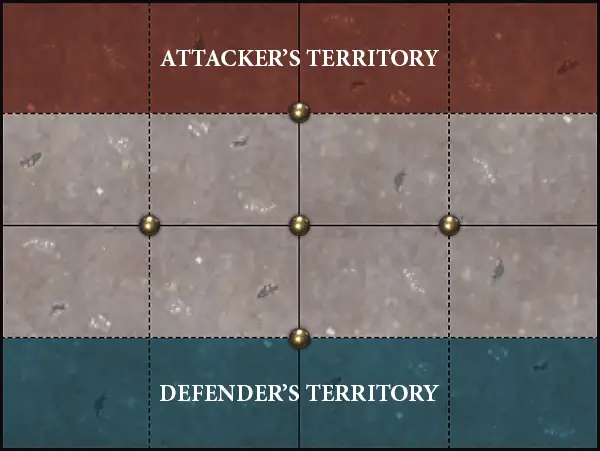 | ||
Battleplan The Realmstone Cache 2 2Alarielle’s great Rite of Life has stirred the Realm of Beasts, such that the lands themselves seem to shift and growl with predatory urges. In these times, the power of amberbone appears to have grown even more potent, rendering the most concentrated nodes of the realmstone quite volatile... THE ARMIES Each player picks an army and then they roll off. The winner chooses which player is the attacker and which is the defender.THE BATTLEFIELD The defender sets up the battlefield. First, they set up objectives as shown on the map. Then, they set up the recommended number of terrain features shown on the Pitched Battles table.DEPLOYMENT The attacker picks which territory is their territory. The other territory is the defender’s territory. The players then use alternating deployment, starting with the attacker. Each player must set up their units wholly within their territory.UNSTABLE REALMSTONE At the start of the third battle round, before determining who will take the first turn, the Realmstone Cache detonates and scatters fragments of realmstone across the battlefield. The defender must remove the objective at the centre of the battlefield and roll a dice. The roll determines the locations of the scattered fragments. Place 2 new objectives on the battlefield in the locations determined by the roll.Designer’s Note: The locations of the scattered fragments do not change, even if the objective at the centre of the battlefield is moved to a different location before the cache detonates. VICTORY POINTS Each player scores victory points at the end of each of their turns as follows:- Score 1 victory point if you control at least one objective. - Score 1 victory point if you control two or more objectives. - Score 1 victory point if you control more objectives than your opponent. - Score 2 victory points if you completed the battle tactic you picked that turn. GRAND STRATEGY Each player scores 3 victory points at the end of the battle if they completed their grand strategy.BATTLE LENGTH The battle lasts for 5 battle rounds.GLORIOUS VICTORY The player with the most victory points at the end of the battle wins a major victory.If the players are tied on victory points at the end of the battle, then the player who completed the most battle tactics wins a minor victory. If both players completed the same number of battle tactics, then if only one player completed their grand strategy, that player wins a minor victory. If both players or neither player completed their grand strategy, the battle is a draw. 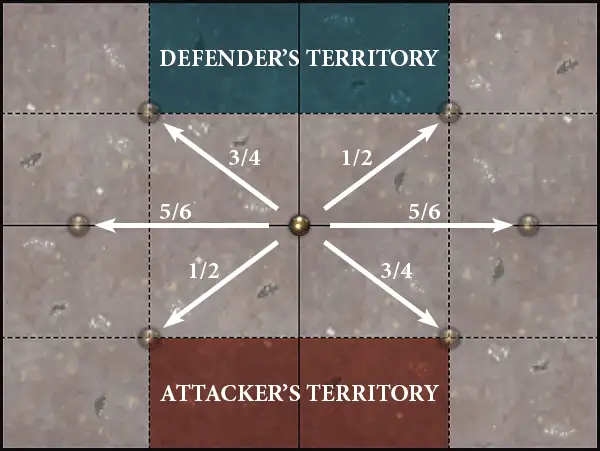 | ||
Battleplan Battlelines Drawn 3 3In this enclosed space, each side must form a line of battle whilst seeking to collapse that of their opponent. There is no opportunity for a surprise attack; victory will be decided at the front ranks. THE ARMIES Each player picks an army and then they roll off. The winner chooses which player is the attacker and which is the defender.THE BATTLEFIELD The defender sets up the recommended number of terrain features shown on the Pitched Battles table.DEPLOYMENT The attacker picks which territory is their territory. The other territory is the defender’s territory. The players then use alternating deployment, starting with the attacker. Each player must set up their units wholly within their territory and more than 9" from enemy territory.HOLD FAST In this battle, the players fight for control of the 4 quarters of the battlefield instead of objectives. Each quarter is controlled in the same manner as an objective (core rules, 18.1.1), except that models must be wholly within a quarter to be able to contest it. In addition, each quarter counts as an objective for the purposes of grand strategies and battle tactics.If you need to measure distances to and from objectives for any other reason, measure to and from the centre of the battlefield quarter. Designer’s Note: While contested and controlled in the same manner as objectives, the table quarters are not considered to be objectives for the purposes of the effects of abilities. VICTORY POINTS Each player scores victory points at the end of each of their turns as follows:- Score 1 victory point if you control at least one quarter of the battlefield. - Score 1 victory point if you control two or more quarters of the battlefield. - Score 1 victory point if you control more quarters of the battlefield than your opponent. - Score 2 victory points if you completed the battle tactic you picked that turn. GRAND STRATEGY Each player scores 3 victory points at the end of the battle if they completed their grand strategy.BATTLE LENGTH The battle lasts for 5 battle rounds.GLORIOUS VICTORY The player with the most victory points at the end of the battle wins a major victory.If the players are tied on victory points at the end of the battle, then the player who completed the most battle tactics wins a minor victory. If both players completed the same number of battle tactics, then if only one player completed their grand strategy, that player wins a minor victory. If both players or neither player completed their grand strategy, the battle is a draw. 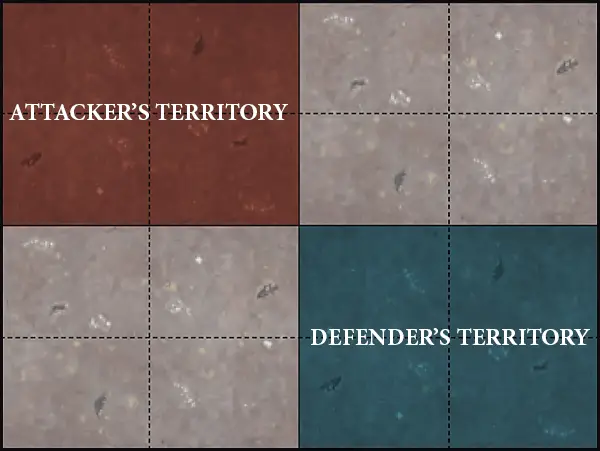 | ||
Battleplan The Lurkers Below 4 4The path to victory in this place is infested with scuttling predators that prowl the shadows. You must either cull them or drive them off before you make progress, lest you leave your rear lines vulnerable as you advance. THE ARMIES Each player picks an army and then they roll off. The winner chooses which player is the attacker and which is the defender.THE BATTLEFIELD The defender sets up the battlefield. First, they set up objectives as shown on the map. Then, they set up the recommended number of terrain features shown on the Pitched Battles table.DEPLOYMENT The attacker picks which territory is their territory. The other territory is the defender’s territory.The players then use alternating deployment, starting with the attacker. Each player must set up their units wholly within their territory. CONQUEROR’S MOMENTUM In this battle, you must control the objective on the border of your territory before you can contest the objective at the centre of the battlefield. In addition, you must control the objective at the centre of the battlefield before you can contest the objective on the border of your opponent’s territory.DEADLY DENIZENS Objectives cannot be controlled in the first battle round.BATTLE LENGTH The battle lasts for 5 battle rounds.GLORIOUS VICTORY Starting from the third battle round, a player immediately wins a major victory if they control all of the objectives on the battlefield.If neither player has won a major victory by the end of the battle, then the player who completed the most battle tactics wins a minor victory. If both players completed the same number of battle tactics, then if only one player completed their grand strategy, that player wins a minor victory. If both players or neither player completed their grand strategy, the battle is a draw. 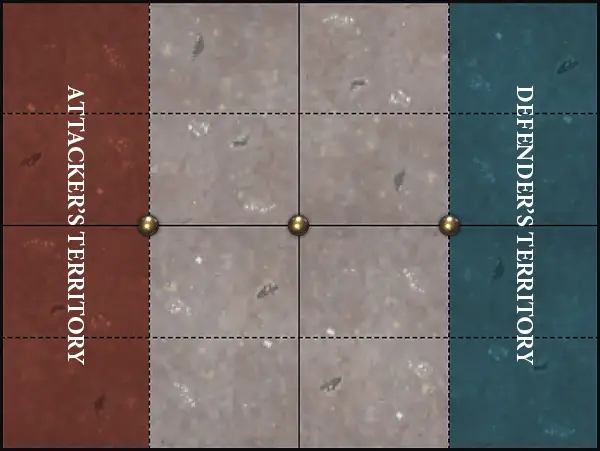 | ||
Battleplan In the Presence of Idols 5 5Famed warriors march to war on both sides this day, acting as anchors in their respective battlelines. However, their martial pride drives them to square off against one another in an attempt to assert dominance. These clashes between champions could prove crucial in determining the outcome of this engagement. THE ARMIES Each player picks an army and then they roll off. The winner chooses which player is the attacker and which is the defender.THE BATTLEFIELD The defender sets up the battlefield. First, they set up objectives as shown on the map. Then, they set up the recommended number of terrain features shown on the Pitched Battles table.DEPLOYMENT The attacker picks which territory is their territory. The other territory is the defender’s territory. The players then use alternating deployment, starting with the attacker. Each player must set up their units wholly within their territory and more than 9" from their opponent’s territory.INSPIRING ICONS After deployment but before determining who will take the first turn in the first battle round, each player must pick 3 different friendly units on the battlefield, starting with the attacker. The units each player picks are their idol units for the battle. LORD KROAK and INCARNATE units cannot be picked as idol units.Halve the number of models that flee due to a failed battleshock test (rounding down) while their unit is wholly within 6" of any idol units in their army. VICTORY POINTS Each player scores victory points at the end of each of their turns as follows:- Score 1 victory point if you control at least one objective. - Score 1 victory point if you control two or more objectives. - Score 1 victory point if you control more objectives than your opponent. - Score 1 victory point for each enemy idol unit that was destroyed by a friendly idol unit during that turn. - Score 2 victory points if you completed the battle tactic you picked that turn. GRAND STRATEGY Each player scores 3 victory points at the end of the battle if they completed their grand strategy.BATTLE LENGTH The battle lasts for 5 battle rounds.GLORIOUS VICTORY The player with the most victory points at the end of the battle wins a major victory.If the players are tied on victory points at the end of the battle, then the player who completed the most battle tactics wins a minor victory. If both players completed the same number of battle tactics, then if only one player completed their grand strategy, that player wins a minor victory. If both players or neither player completed their grand strategy, the battle is a draw. 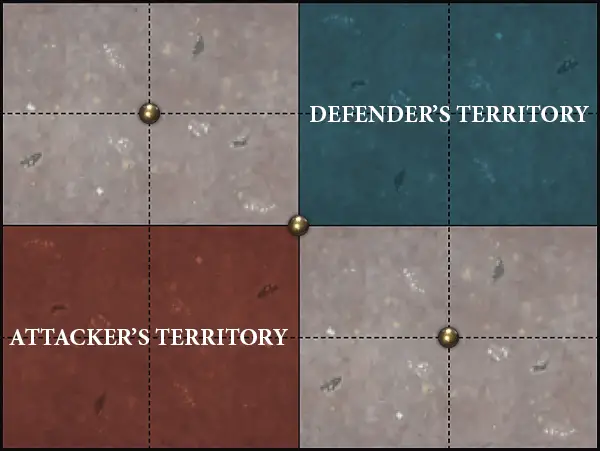 | ||
Battleplan The Nidus Paths 6 6This area is riddled with tunnels and holes, as though it were the hive of some colony of monstrous insects. Right now, pondering what may have created them will do you no good, for the enemy approaches. However, these twisted paths might well provide the perfect opportunity to launch a surprise attack... THE ARMIES Each player picks an army and then they roll off. The winner chooses which player is the attacker and which is the defender.THE BATTLEFIELD The defender sets up the battlefield. First, they set up objectives as shown on the map. Then, they set up the recommended number of terrain features shown on the Pitched Battles table.DEPLOYMENT The attacker picks which territory is their territory. The other territory is the defender’s territory. The players then use alternating deployment, starting with the attacker. Each player must set up their units wholly within their territory and more than 9" from their opponent’s territory.THE NIDUS PATH The battlefield hosts 4 tunnels called nidus paths. Each nidus path is located at a corner of the battlefield edge as shown on the map.At the end of their movement phase, players can pick 1 friendly unit wholly within 6" of a nidus path. If they do so, they must remove that unit from the battlefield and set it up again wholly within 6" of that nidus path’s twin, more than 9" from all enemy units. For example, if a unit is removed from the battlefield via nidus path B in the top-left corner of the map, that unit must be set up again wholly within 6" of nidus path B in the bottom-right corner of the map. VICTORY POINTS Each player scores victory points at the end of each of their turns as follows:- Score 1 victory point if you control at least one objective. - Score 1 victory point if you control two or more objectives. - Score 1 victory point if you control more objectives than your opponent. - Score 2 victory points if you completed the battle tactic you picked that turn. GRAND STRATEGY Each player scores 3 victory points at the end of the battle if they completed their grand strategy.BATTLE LENGTH The battle lasts for 5 battle rounds.GLORIOUS VICTORY The player with the most victory points at the end of the battle wins a major victory.If the players are tied on victory points at the end of the battle, then the player who completed the most battle tactics wins a minor victory. If both players completed the same number of battle tactics, then if only one player completed their grand strategy, that player wins a minor victory. If both players or neither player completed their grand strategy, the battle is a draw. 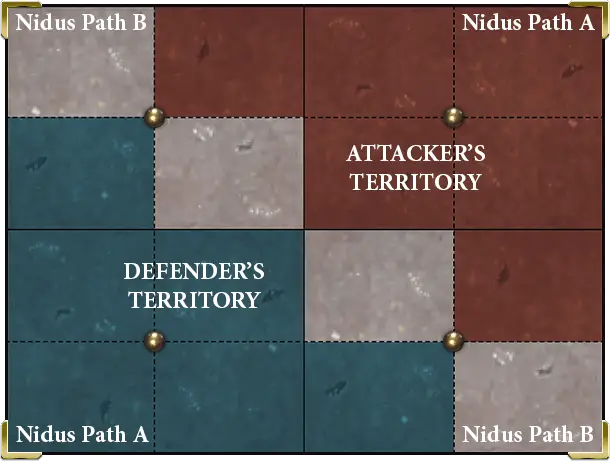 | ||
Battleplan Only the Worthy 1 1Sometimes, the day is carried by the example of a handful of individuals possessed of a rare clarity of purpose. THE ARMIES Each player picks an army and then they roll off. The winner chooses which player is the attacker and which is the defender.THE BATTLEFIELD The defender sets up the battlefield. First, they set up objectives as shown on the map. Then, they set up the recommended number of terrain features shown on the Pitched Battles table.DEPLOYMENT The attacker picks which territory is their territory. The other territory is the defender’s territory. The players then use alternating deployment, starting with the attacker. Each player must set up their units wholly within their territory and more than 9" from enemy territory.SHRINES OF CONQUEST While there are any GALLETIAN CHAMPIONS within 6" of an objective, only GALLETIAN CHAMPIONS can contest that objective. In addition, no more than 1 GALLETIAN CHAMPION from the same army can contest the same objective at the same time.VICTORY POINTS Each player scores victory points at the end of each of their turns as follows:- Score 1 victory point if you control at least one objective. - Score 1 victory point if you control two or more objectives. - Score 1 victory point if you control more objectives than your opponent. - Score 2 victory points if you completed the battle tactic you picked that turn. GRAND STRATEGY Each player scores 3 victory points at the end of the battle if they completed their grand strategy.BATTLE LENGTH The battle lasts for 5 battle rounds.GLORIOUS VICTORY The player with the most victory points at the end of the battle wins a major victory.If the players are tied on victory points at the end of the battle, then the player who completed the most battle tactics wins a minor victory. If both players completed the same number of battle tactics, then if only one player completed their grand strategy, that player wins a minor victory. If both players or neither player completed their grand strategy, the battle is a draw. 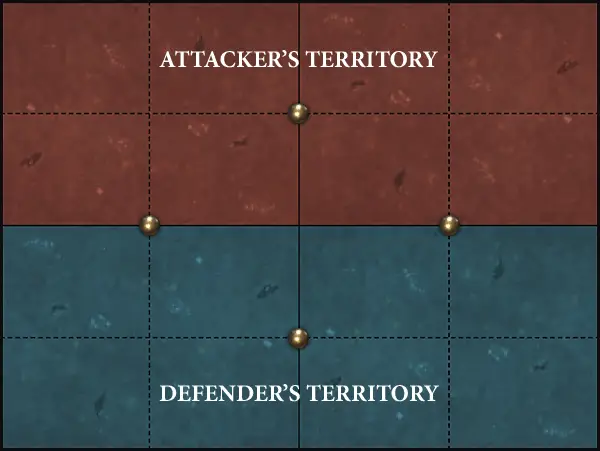 | ||
Battleplan The Jaws of Gallet 3 3In Ghur, the land itself is possessed of a hungry animus. This is particularly evident in Gallet, where sinkholes open up with perilous frequency, swallowing in moments assets that had been acquired at a steep cost in blood. THE ARMIES Each player picks an army and then they roll off. The winner chooses which player is the attacker and which is the defender.THE BATTLEFIELD The defender sets up the battlefield. First, they set up objectives as shown on the map. Then, they set up the recommended number of terrain features shown on the Pitched Battles table.DEPLOYMENT The attacker picks which territory is their territory. The other territory is the defender’s territory. The players then use alternating deployment, starting with the attacker. Each player must set up their units wholly within their territory and more than 9" from enemy territory.SWALLOWED BY THE CAVERNS At the start of each battle round after the first, after priority has been determined, the player taking the second turn in that battle round can pick 1 objective on the battlefield to be swallowed by the caverns below. If they do so, that objective is removed from play.VICTORY POINTS Each player scores victory points at the end of each of their turns as follows:- Score 1 victory point if you control at least one objective. - Score 1 victory point if you control two or more objectives. - Score 1 victory point if you control more objectives than your opponent. - Score 2 victory points if you completed the battle tactic you picked that turn. GRAND STRATEGY Each player scores 3 victory points at the end of the battle if they completed their grand strategy.BATTLE LENGTH The battle lasts for 5 battle rounds.GLORIOUS VICTORY The player with the most victory points at the end of the battle wins a major victory.If the players are tied on victory points at the end of the battle, then the player who completed the most battle tactics wins a minor victory. If both players completed the same number of battle tactics, then if only one player completed their grand strategy, that player wins a minor victory. If both players or neither player completed their grand strategy, the battle is a draw. 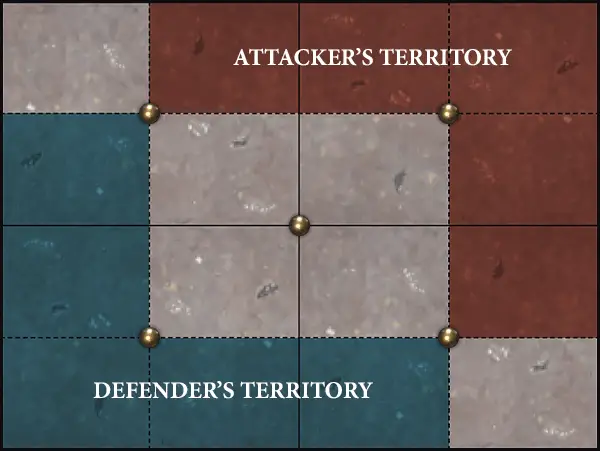 | ||
Battleplan Ours for the Taking 4 4A great prize in enemy territory lies tantalisingly close; however, your own resources are equally exposed. You must focus your efforts on protecting what’s yours while pushing to seize the valuables of the foe. A capable leader centrally positioned would be a boon in such a confrontation, as they would provide an anchor for the simultaneous offensive and defence. THE ARMIES Each player picks an army and then they roll off. The winner chooses which player is the attacker and which is the defender.THE BATTLEFIELD The defender sets up the battlefield. First, they set up objectives as shown on the map. Then, they set up the recommended number of terrain features shown on the Pitched Battles table.HOME OBJECTIVES The objective on the border of each territory is the home objective of the relevant player.DEPLOYMENT The attacker picks which territory is their territory. The other territory is the defender’s territory. The players then use alternating deployment, starting with the attacker. Each player must set up their units wholly within their territory.VICTORY POINTS Each player scores victory points at the end of each of their turns as follows:- Score 1 victory point if you control your home objective. - Score 1 victory point if you control the centre objective. - Score 2 victory points if you control the enemy’s home objective. - Score 1 victory point if you control the centre objective and that objective is contested by a friendly GALLETIAN CHAMPION. - Score 2 victory points if you completed the battle tactic you picked that turn. GRAND STRATEGY Each player scores 3 victory points at the end of the battle if they completed their grand strategy.BATTLE LENGTH The battle lasts for 5 battle rounds.GLORIOUS VICTORY The player with the most victory points at the end of the battle wins a major victory.If the players are tied on victory points at the end of the battle, then the player who completed the most battle tactics wins a minor victory. If both players completed the same number of battle tactics, then if only one player completed their grand strategy, that player wins a minor victory. If both players or neither player completed their grand strategy, the battle is a draw. 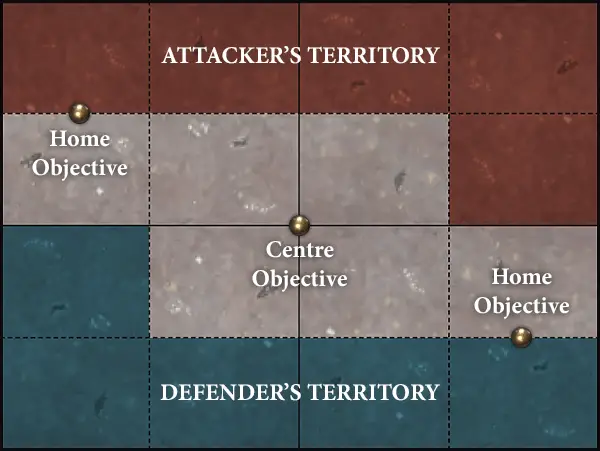 | ||
Battleplan Twists and Turns 5 5Molten amberbone bubbles up from fissures in this location, though the precise moment at which this phenomenon occurs is anyone’s guess. One can only wait for the distinctive rumbling sounds that precede the effusion of the precious resource and then rush to gather it. THE ARMIES Each player picks an army and then they roll off. The winner chooses which player is the attacker and which is the defender.THE BATTLEFIELD The defender sets up the battlefield. First, they set up objectives as shown on the map. Then, they set up the recommended number of terrain features shown on the Pitched Battles table.OBJECTIVES The objectives used for this battle are either active or inactive. At the start of the battle, all objectives are active.DEPLOYMENT The attacker picks which territory is their territory. The other territory is the defender’s territory. The players then use alternating deployment, starting with the attacker. Each player must set up their units wholly within their territory and more than 9" from enemy territory.CHANGING PRIORITIES At the end of each player’s turn, after any victory points have been scored, the player whose turn is taking place must roll a dice for each active objective they control. Add 1 to the roll if that objective is contested by any friendly GALLETIAN CHAMPIONS. On a 1-3, that objective becomes inactive. On a 4+, it remains active.At the start of each player’s hero phase, the player whose turn is taking place rolls a dice for each inactive objective they control. On a 1-3, it remains inactive. Add 1 to the roll if that inactive objective is contested by any friendly GALLETIAN CHAMPIONS. On a 4+, it becomes active once more. VICTORY POINTS Each player scores victory points at the end of each of their turns as follows:- Score 1 victory point if you control at least one active objective. - Score 1 victory point if you control two or more active objectives. - Score 1 victory point if you control more active objectives than your opponent. - Score 2 victory points if you completed the battle tactic you picked that turn. GRAND STRATEGY Each player scores 3 victory points at the end of the battle if they completed their grand strategy.BATTLE LENGTH The battle lasts for 5 battle rounds.GLORIOUS VICTORY The player with the most victory points at the end of the battle wins a major victory.If the players are tied on victory points at the end of the battle, then the player who completed the most battle tactics wins a minor victory. If both players completed the same number of battle tactics, then if only one player completed their grand strategy, that player wins a minor victory. If both players or neither player completed their grand strategy, the battle is a draw. 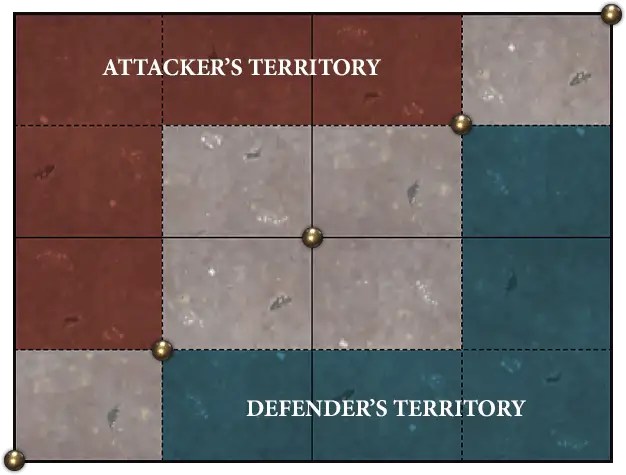 | ||
Battleplan Position Over Power 6 6Chunks of amberbone have been exposed in the walls of this canyon by a recent tectonic disturbance, but your advisors have warned that they will soon be swallowed up by the hungry bedrock of Gallet. You must dispatch capable leaders to secure what they can from these sites before the land reclaims them. THE ARMIES Each player picks an army and then they roll off. The winner chooses which player is the attacker and which is the defender.THE BATTLEFIELD The defender sets up the battlefield. First, they set up objectives as shown on the map. Then, they set up the recommended number of terrain features shown on the Pitched Battles table.OBJECTIVES The objectives at the centre of each narrow battlefield edge are the flank objectives.DEPLOYMENT The attacker picks which territory is their territory. The other territory is the defender’s territory. The players then use alternating deployment, starting with the attacker. Each player must set up their units wholly within their territory and more than 9" from enemy territory.LOST IN THE LANDSLIDE At the start of the fourth battle round, the flank objectives are removed from play.VICTORY POINTS Each player scores victory points at the end of each of their turns as follows:- Score 1 victory point if you control at least one objective. - Score 1 victory point if you control two or more objectives. - Score 1 victory point if you control more objectives than your opponent. - Score 1 victory point if you control any flank objectives that are contested by a friendly GALLETIAN CHAMPION. - Score 2 victory points if you completed the battle tactic you picked that turn. GRAND STRATEGY Each player scores 3 victory points at the end of the battle if they completed their grand strategy.BATTLE LENGTH The battle lasts for 5 battle rounds.GLORIOUS VICTORY The player with the most victory points at the end of the battle wins a major victory.If the players are tied on victory points at the end of the battle, then the player who completed the most battle tactics wins a minor victory. If both players completed the same number of battle tactics, then if only one player completed their grand strategy, that player wins a minor victory. If both players or neither player completed their grand strategy, the battle is a draw. 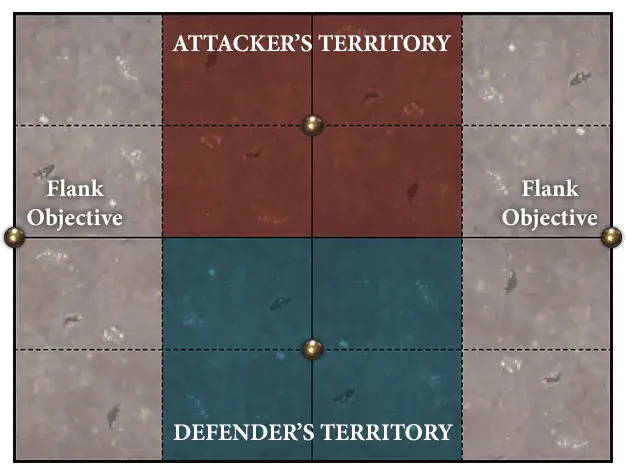 | ||
Pitched Battle Publications 2022-23 - Season 2
As Warhammer Age of Sigmar continues to grow, naturally we will continue to write rules for the game. However, when you are playing competitively, sometimes it’s hard to know which of these rules are ‘legal’ - in other words, which rules you can use in Pitched Battles. In this section we’ve provided a handy at-a-glance list which shows you all the publications whose rules you are allowed to use in Pitched Battles.Core
- Warhammer Age of Sigmar Core Book
- General’s Handbook: Pitched Battles 2022-23 - Season 2
- Pitched Battle Profiles 2022-23 - Season 2
Battletomes
- Battletome: Beasts of Chaos
- Battletome: Blades of Khorne
- Battletome: Cities of Sigmar
- Battletome: Daughters of Khaine
- Battletome: Disciples of Tzeentch
- Battletome: Flesh-eater Courts
- Battletome: Fyreslayers
- Battletome: Gloomspite Gitz
- Battletome: Hedonites of Slaanesh
- Battletome: Idoneth Deepkin
- Battletome: Kharadron Overlords
- Battletome: Lumineth Realm-lords
- Battletome: Maggotkin of Nurgle
- Battletome: Nighthaunt
- Battletome: Ogor Mawtribes
- Battletome: Orruk Warclans
- Battletome: Ossiarch Bonereapers
- Battletome: Seraphon
- Battletome: Skaven
- Battletome: Slaves to Darkness
- Battletome: Sons of Behemat
- Battletome: Soulblight Gravelords
- Battletome: Stormcast Eternals
- Battletome: Sylvaneth
Expansions
- Wrath of the Everchosen
- Broken Realms: Morathi
- Broken Realms: Teclis
- Broken Realms: Be’lakor
- Broken Realms: Kragnos
- Season of War: Thondia
Tunnel Master
The twisting tunnels of Gallet are well known to this champion, who expertly navigates the darkness to outmanoeuvre their enemies.Once per battle, instead of picking this GALLETIAN CHAMPION to make a normal move, you can remove it from the battlefield and set it up again on the battlefield more than 9" from all enemy units.
Mortal wounds caused while a unit is attacking are allocated at the same time as wounds caused by the unit’s attacks: after all of the unit’s attacks have been made. Mortal wounds caused at other times are allocated as soon as they are caused. Mortal wounds are allocated in the same way as wounds and are treated in the same manner as wounds for rules purposes.
Fuelled by Ghurish Rage
Many have tried and failed to best this champion, only to awaken the raging beast that stirs within their soul.Once per battle, before you allocate a wound or mortal wound to this GALLETIAN CHAMPION and that wound or mortal wound would cause it to be slain, you can roll a dice. On a 3+, that wound or mortal wound is negated, you can heal up to D3 wounds allocated to it and any wounds that currently remain to be allocated to it are negated.
| Most rules for artefacts of power refer to the bearer. The bearer is the model to which an artefact of power has been given (see section 27.5.2 for some examples). | ||
- Unit champions can issue commands to their own unit (see 22.3.2).
- HEROES can issue commands to units that are wholly within 12" of them.
- Generals can issue commands to units that are wholly within 18" of them.
- TOTEMS can issue commands to units that are wholly within 18" of them.
| You do not have to pick a target for a charge attempt before making the charge roll. | ||
When you set up a reserve unit, either during deployment or once the battle is underway, you must tell your opponent that the unit is in reserve and keep it to one side instead of placing it on the battlefield. At the start of the fourth battle round, units that are still in reserve are destroyed. Units cannot cast spells or use abilities while they are in reserve unless the spell or ability specifically says it can be used by reserve units.
| Reserve units are picked as part of your army before the battle begins, while summoned units are units added to your army once the battle is underway. Models that have been removed from play can be used as part of a summoned unit. | ||
You can use this command ability at the start of the hero phase. The unit that receives the command must be more than 3" from all enemy units. Roll 1 dice for each slain model from that unit. For each 6, you can return 1 slain model to that unit.
You can only return models to that unit that have a combined Wounds characteristic of 10 or less. For example, if the unit that received the command has a Wounds characteristic of 2, you can return a maximum of 5 models to that unit.
You can use this command ability when you pick a friendly unit to shoot in your shooting phase or fight in the combat phase. That unit must receive the command. Add 1 to hit rolls for attacks made by that unit until the end of that phase.
You can use this command ability when a friendly unit is picked as the target of an attack in the shooting or combat phase. That unit must receive the command. Add 1 to save rolls for attacks that target that unit until the end of that phase.
You can use this command ability in the enemy movement phase after an enemy unit finishes a normal move, run or retreat. The unit that receives the command must be within 9" of that enemy unit and more than 3" from all enemy units. You can make a D6" move with the unit that receives the command, but it must finish the move more than 3" from all enemy units and cannot shoot later in the turn.
| If a slain model is returned to its unit in the same turn that it is slain, it still counts as having been slain in that battle round for the purposes of battleshock tests. | ||
Contents | ||
 1.1
1.1 